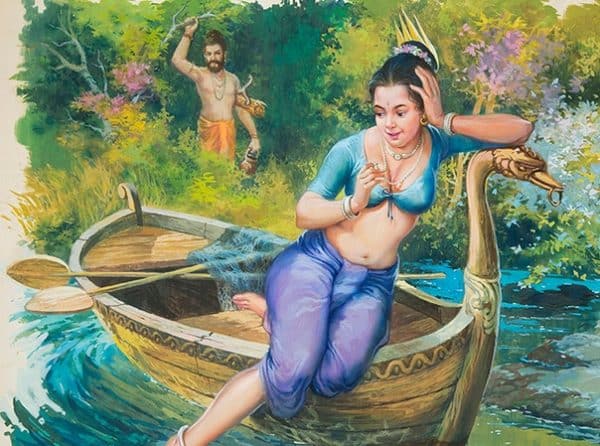Maharshi Parashara is a well-known Vedic Sage who is regarded as the father of Jyotish Shastra or Vedic Astrology. He is accredited as the author of Vishnu Purana, the first of 18 Puranas of Hindu Literature compiled by his son Veda Vyasa. Parashara Rishi was the son of Shakti Muni and Adrishyanti and a disciple of Bashkal and Yajnavalkya.
Birth of Rishi Parashara
Sage Parashara was actually raised by his grandfather, Rishi Vasishtha, one of the Saptarishi. It is because his father Shakti Muni had died before his birth and there is an interesting story behind the birth of Sage Parashara involving the death of his father Shakti Muni.
Curse of Sakti Muni to Veerasha, Prince of Ayodhya
Once when Shakti Muni was crossing the bridge, there came the prince of Ayodha named Veersah. Veersah was the son of King Sudaas and grandson of King Rituparan belonging to the Ikshavaku Dynasty. Veersah was riding on his chariot so that there was no enough space left for Shakti Muni to move forward. Shakti Muni politely requested Veersah, but the king did not pull back his chariot. They both remained stuck on the matter. When Veersah did not compromise, Shakti Muni became very angry and cursed Veersha to become a Rakshasa. Soon the king turned into a monster. Then the Rakshasa killed the sons of Rishi Vasishtha along with Shakti Muni.
When the sage Vashistha came to know of this incident, he got frustrated with extreme sorrow. Distracted Rishi also decided to give up his life. But he could not succeed even after trying many times. Then went to the Himalayas with his family.
One day, suddenly the recite of the Veda started to be heard and he started looking around in amazement. But he did not see anyone who was reciting the Vedas. Then Shakti Muni’s wife told him that she was pregnant and the child in the womb was pronouncing Vedas for over 12 years. Rishi Vashistha got happy and discarded the idea to give up his life. The child was Parashara.
Rishi Parashara and Satyavati

Satyavati, also named Matsyagandha because her organs smelled like fish, used to work as a sailor. Her work was to take people across the river Yamuna in her boat. One day Rishi Parashara got in her boat in course of crossing the river and fell attracted to her beauty. Rishi Parashara then expressed his desire to have a relationship with her. But she refused to have an immoral relationship. However, Parashara kept on pleading her and at last, Satyavati agreed under three conditions:
- No one should see what they were doing. So, the sage Parashara spreads dense fog all around with his yogic power and makes peace with Satyavati.
- Her virginity should not be dissolved under any circumstances. Parashara then assured her that she would get her virginity back after she gave birth.
- She wanted the fishy odor that came from her body to be transformed into an aroma. Then the sage made an atmosphere of fragrance.
After this, both of them made a relationship and a son was born from Satyavati named Krishnadvaipayan. Later Krishnadvaipayan was popularly known as Veda Vyasa, a compiler of Four Vedas.
Revenge of Rishi Parashara
When sage Parashara grew up, he came to know that his father was killed by a Rakshasa. Then he decided to take revenge that he would end all Rakshasa clan from the earth. So, he started a Yajna named, Rakshasa Satra Yajna. As a result, all the Rakshasas in the world including the blameless ones started turning into ashes one by one.
Maharishi Pulastya (Grandfather of Ravana) approached Parashara Rishi and requested him to stop this Yajna and he also preached non-violence. He explained that it is unfair to kill all Rakshasa without any fault. After the prayers and sermons of Pulastya and Vyasa, he stopped this by giving the complete sacrifice of the demon-session yajna. Being pleased with it, Maharishi Pulstya gave him many blessings and also told a prediction in the future composition of the Purana Samhita. Later on, he composed many scriptures including Purana Samhita.
Compositions of Parashara

The sage Parashara had acquired knowledge of many disciplines and given them to the world. Parashara has many verses in the Rigveda. The Vishnu Purana, Parashara Samhita, Videharaj Janaka referred to as Gita (Parashara Geeta), BrihatParashara Sanhita, etc. are compositions of Parashara.
Parashara Gita
In the dialogue of Bhishma and Yudhishthira in the Shanti Parva of Mahabharata, Bhishma reveals the conversation between Raja Janak and Parashara to Yudhishthira. This conversation is known as ‘Parashara Gita’. There are talks of knowledge related to religion and action. In fact, in Shanti Parva, a detailed description of the answers to all kinds of philosophy and religion questions is available.
Parashara’s Astrology
Parashara Rishi composed many texts out of which his texts written about astrology are very important. Astrology of ancient and present is based on the rules laid down by Parashara. Rishi Parashara has written the BrihatParashara Hora Shastra, LaghuParasharai (Astrology).
